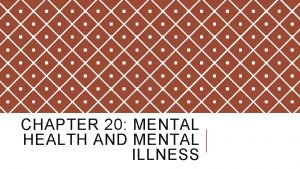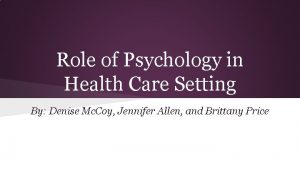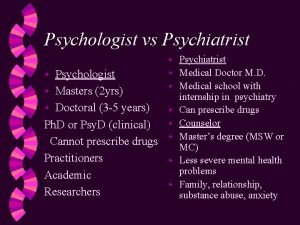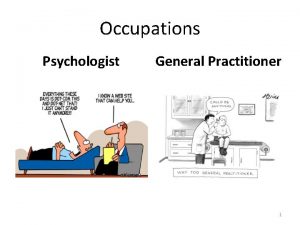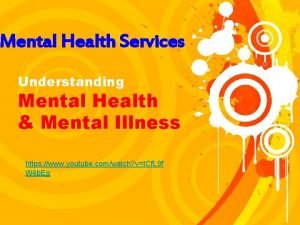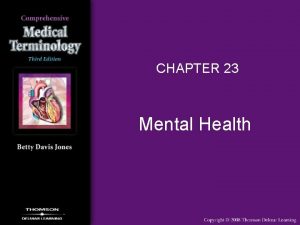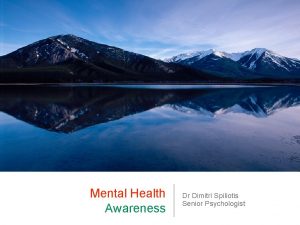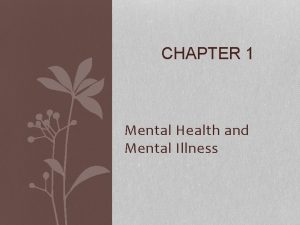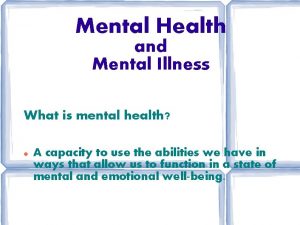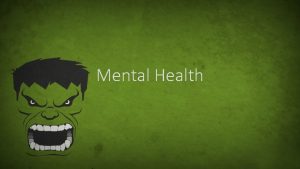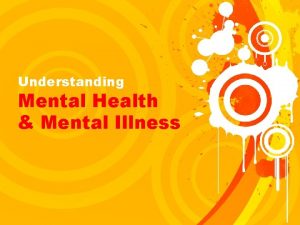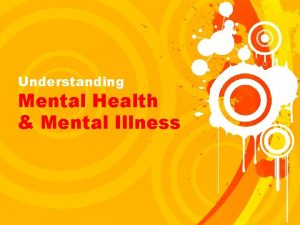Risa Trought Consultant Psychologist Muslim Mental Health and
































- Slides: 32

Risa Trought Consultant Psychologist Muslim Mental Health and Wellbeing Child Adolescent and Family Services (CAF) Specialist Mental Health

Supporting Children & Their Families Through Grief & Loss • Overview of grief • Considerations when working with children • How to support children & their families/whanau

Professional Self Care

Grief and Loss • Different situations can cause a sense of loss e. g. losing a favourite toy, parental separation, moving to a new city, acquired disability due to injury, loss of a pet • Grief due to a significant loss or death of a loved one • Loss can bring sadness into a child’s life and require adjustment, coping skills and extra support • Grief is a natural response to loss

Natural experiences in the world Children need guidance from adults

Practices to help process grief


Children’s reactions to loss depend on… • Child’s relationship to the person who has died. Personally meaningful relationship, e. g. Attachment figure- parent? Grandparent? • Secondary loss- life changes after a death, e. g. move to new home, change of school, parent having to work more • Available social supports for the child- e. g. emotionally available adult, extended whanau and friends • Secure relationship to parents prior to experience of death and general functioning • Age and development of the child and individual factors (e. g. socio-emotional, cognitive, language, resiliency, sense of self)

Grief in Children’s grief reactions tend to be longer in duration than adults Children have different ways of coping with loss than adults Children need consistently available adult parenting figures to process a loss and tolerate the painful feelings Children’s limited cognitive development may hinder their understanding of death. They may re-process things as they mature and acquire capacity at different developmental stages. A child’s identity may be affected by a loss because selfdevelopment is still in process Grief processes may become intertwined with developmental processesdifficult to determine when grieving ends and normal development resumes

Developmental Considerations - Biopsychosocial Model - Multiple factors to consider - Strengths and vulnerabilities - Systemic factors - Past experiences

Developmental Issues: Babies and toddlers Common presentations: • Irritability, crying • Changes to eating and sleeping patterns • Difficult to soothe • Somatic problems e. g. Constipation, sore tummy • Regression- sleep, eating, wanting to be spoon fed again • Behaviour change- withdrawal, frustration/aggression • Separation anxiety, clinginess and fearful of unfamiliar adults

Developmental Issues: Babies and toddlers Developmental considerations: • Non-verbal stage (limited language) • Sensory motor skills developing (body-based, intrinsic memory) • Less language to understand explanation, narrative of what happened • Dependent and reliant on caregiver-survival instinct. Attachment figure? • Familiar person- “disappears” no longer there. • Disruption to daily routines, smells, feel, rhythms and voice of loved one • Reactions to adult grief. Impact of emotionally unavailable parent- Attunement, attentiveness. Exposure to adult distress. • Parent coping and mental health

Developmental Issues: Preschool to 5 years Common presentations: • Anxiety (often separation anxiety, general anxiety) • Temper tantrums and aggression • Regression e. g. toileting, return to thumb sucking • Sleep disturbance • Bedwetting • Preschooler may talk about death but still expect the person to return • Express through behaviour and play

Developmental characteristics: • Egocentric, magical thinking, language and cognitive skills still immature • Moralistic (bad things happen to bad people) Developmental Issues: Preschool to 5 years • May fear they caused the death • Angry at deceased for not returning • Fear of further abandonment or loss • Death is an abstract concept- may think the person will come back • Black and white thinking- need concrete and basic explanations • Repetitive questions • Young children will use their imagination to fill the gaps if they don’t have information-fantasy

Developmental Issues: Primary Aged Children Common Presentations: • Disrupted sleep, nightmares, changes in eating • Repetitive questions • Concerns about safety and abandonment. • Anxiety, somatic complaints, e. g. stomach aches, headaches • Worries about personal safety and of others • Short periods of strong reaction, mixed with appearing as though nothing has happened • Regression, Behaviour change, overactive, withdrawal, aggression • Play out themes to make sense of their world • Learning issues

Developmental Considerations: • Concrete thinking. Vulnerable to faulty beliefs- hospitals cause death (not the injury or illness) • Be prepared for repetitive questions. Need death explained with correct information and concrete language Developmental Issues: Primary Aged Children • May need lots of physical and emotional nurturance • Starting to understand death is permanent and how loss will affect them long term. By age 9 -10 yrs understand death is final and irreversible • May have feelings of guilt or regret- believe its their fault. Egocentric • May inhibit feelings of sadness and fear • May assume caregiving role to parent or siblings • May be worried about personal failings/mistakes, doing things right • Phobia and worries about illness may occur (hypochondria) • Magical thinking and fantasy

Developmental Issues: Preadolescents/ Adolescents Common Presentations: • Anxiety, depression, guilt • Withdrawal from family or other supports • Inability to concentrate- school difficulties • Sleep and appetite changes/disturbance • Unpredictable and intense emotions • Fear about death or violence occurring again • Confusion over role identity in family • Hypervigilance • May have thoughts of suicidal and self harm • Risk taking behaviours

Developmental Considerations: • Emotional experiences kept private, want to fit in with peers (don’t want to be different) • Less likely to seek out comfort or accept support when offered, Transition -individuation from the family Developmental Issues: Preadolescents/ Adolescents • More likely to become depressed and withdrawn after a death • Try to escape emotions through acting out behaviour e. g. running away, delinquent behaviour • Intellectual struggle, unfairness of death, • Greater cognitive capacity (abstract thinking, problem solving and reasoning), also allows for rumination/over thinking • Take on caregiving role for parent/siblings • Feelings of guilt or regret • May question identity, spirituality, beliefs • Anger and risk taking may counteract feelings of helplessness and fear

Family/Whanau Factors • Who are the family members affected by grief? How are they affected? • Has it disrupted family functioning (temporarily or longer term? ) • Has the death changed family roles and responsibilities? Is this impacting on the child/adolescent’s developmental stage? • Is there a change in financial situation? Practical issues. Disruptions- e. g. moving house/school • How are the parent(s) coping? What supports do they have? • Is there an emotionally available parent/caregiver • Are the family able to talk about and express feelings in general? Can they talk about the death and the loss of the loved one? Family communication style • Is there a clear narrative of what has happened? • Is the child supported to process feelings of grief/ supported to engage with social rituals, e. g. attend funeral • Cultural, spiritual, religious values and practices

• Can the parent(s) show appropriate emotions, model grief to children? Is it taboo to talk about it? • Has the parent become overprotective? This can discourage healthy independence • Can the parent separate child’s feelings to their own feelings- or is this confused? • Secondary grief- change in parenting capacity, unavailable parent • Parental limit setting - lack energy to sent firm consistent boundaries - Sympathise with child’s loss and feel unable to set boundaries • Parent depressed, irritable, unpredictable, or hostile? • Is parent overwhelmed and not able to contain emotions adequately • Parent emotionally shutdown? • Parent over relying on their child for emotional support?


How can we help?

General Considerations- Whanau/Parents • Provide psychoeducation for parents- grief and developmental needs of children • Help build parent confidence that they can support their child to heal • Help address family dynamics and roles/responsibilities • Create consistent routines, re-establish safety and stability • Set appropriate boundaries and family rules- but be flexible when needed • Provide honest explanation of the death, answer questions as they arise appropriate to the child’s needs • Offer physical comfort and nurturance • Connect and support during emotional distress and dysregulation • Naming the emotion, link to experience, helping to calm by validating feelings • Help the child/young person feel understood, all feelings are normal • Parents/adults may need their own support if they are not coping. Do parents have emotional capacity? • Work systemically with parents and not just child/young person in isolation

• Help child develop emotional language to process grief • Build communication in the family • Behaviour is form of communication • Develop help seeking behaviours and other coping skills • Explore and understand their subjective experience • Address errors in thinking or misperceptions, e. g. it was their fault because they were mad at dad in the morning • Help develop coherent narrative of events and answer questions honestly as possible with age appropriate information • Objects- photo albums, special object to remember, soft toy/transitional object for younger children • Use of art, drawing, story books, and photo albums, movement & sensory soothing • Children may need to know that the surviving parent is healthy, and the backup plans of guardianship General Considerations for children and teenagers

• Prepare the child for loss where possible e. g. illness • Avoid confusing terms and euphemisms, e. g. a long sleep, on a trip, lost, passed on • Child may idealize the dead parent or adult or have a less balanced view of them. Ambivalence about relationship- build healthy perspective • Avoidance, denial, numbing, withdrawal, risky behaviours, self harm, aggression, dissociation, are a person’s attempts to cope with and survive distress- support development of healthier strategies • Side by side conversations can help kids/teens talk, e. g. in the car, playing a game • Help restore child back to healthy developmental pathway- age appropriate responsibilities, activities, and independence. Parenting factors may need to be addressed e. g. overprotectiveness, enmeshment, over-reliance on child/parentified child • Children need to continue to develop mastery of their world • Experience of stressful events such as death of a parent may lead to mental health difficulties which are in excess of healthy grief process • Child’s play perseverative/stuck- help shift and build healthier narrative

• Professionals can provide a neutral relationship to allow space for conversations that may be difficult for a child to express directly to a parent (e. g. fear of hurting or causing harm) • If a parent is unable to coregulate the child and therefore avoid stressful topics such as death. The child may be left stuck with complex and difficult emotions, their imagination and fears. Feel responsible to protect the parent and not “burden” them. • Child/adolescent needs a consistent and safe adult who can help them process grief, tolerate difficult and painful emotions and allow for adjustment to life without the loved one • Help child/adolescent redefine their relationship with their lost loved one or object and hold on to meaningful memories • Permission to enjoy activities again- older children may be worried about other people’s expectations • Children may express guilt about their misbehaviour or missed opportunities to express affection or spend time with them before they died • Assessment of the child and family functioning will help determine areas for intervention

Children and Adolescents need… Worden (1996) • • • Adequate and correct information Fears and anxieties addressed Reassurance that they are not to blame Careful listening Validation of feelings Help with overwhelming feelings Involvement and inclusion Continued routines Modelled grief behaviours Opportunities to remember

Social Stigma and Shame

Normalising the grief process

Resources • https: //skylight. org. nz/ • https: //www. kidshealth. org. nz/bereavement-reactions-children-youngpeople-age-group • https: //health. tki. org. nz/Key-collections/Curriculum-in-action/Changeloss-and-grief/The-developmental-stages-of-children-and-theirresponses-to-loss • Seasons for growth (Grief and loss peer support education programme). In Christchurch run by Catholic Social Services and Mana Ake • Cancer Society • Community agencies, counsellor, school counsellor, Mana Ake in Canterbury • EAP services for workplace- staff

Resources • Corr, C. A. & Corr, C. A. (1996)Ed. Handbook of Childhood Death and Bereavement. New York: Springer Publishing Company • Worden, J. W (1996) Children and grief when a parent dies. New York: Guilford • Corr, C. A. & Balk, D. E. (2010) Ed. Children’s encounters with death, bereavement, and coping. New York: Springer Publishing Company • Heath, M. A. , Leavy, D. , Hansen, K. , Ryan, K. , Lawrence, L. , & Sonntag, A. G. (2008). Coping with grief: Guidelines and resources for assisting children. Intervention in School and Clinic, 43(5), 259 -269 • www. dougy. org Grief resources and handouts for families and professionals

Any questions?
 Chapter 20 mental health and mental illness
Chapter 20 mental health and mental illness Mental health jeopardy
Mental health jeopardy Role of health psychologist
Role of health psychologist Risa restaurant
Risa restaurant Ríša nad ktorou slnko nezapadá
Ríša nad ktorou slnko nezapadá Homófonos
Homófonos Pápež
Pápež Life of a plant by risa jordan
Life of a plant by risa jordan Risa catering malang
Risa catering malang Risa dickson
Risa dickson Arabská ríša
Arabská ríša Arabská ríša dejepis
Arabská ríša dejepis Risa robinson rit
Risa robinson rit Isaac siegel
Isaac siegel Signos de risa
Signos de risa Life of a plant poem
Life of a plant poem Risa siegel
Risa siegel Svätoplukova ríša mapa
Svätoplukova ríša mapa Risa fox
Risa fox Hlavné mesto byzantskej ríše
Hlavné mesto byzantskej ríše Linkrisa
Linkrisa Que es lenguaje no verbal
Que es lenguaje no verbal Aries producciones existe
Aries producciones existe Ela familiar
Ela familiar Samova riša
Samova riša Risa sardonica
Risa sardonica Franská ríša
Franská ríša Wogastisburg
Wogastisburg Amor mio si vieras
Amor mio si vieras Maymun chechagi qanday kasallik
Maymun chechagi qanday kasallik Quien te dijo que yo era risa siempre nunca llanto
Quien te dijo que yo era risa siempre nunca llanto Risa siegel
Risa siegel Powerpoints de risa
Powerpoints de risa
